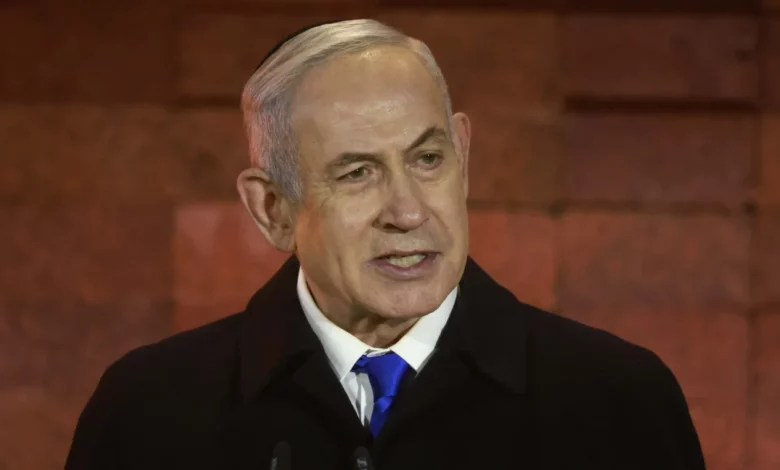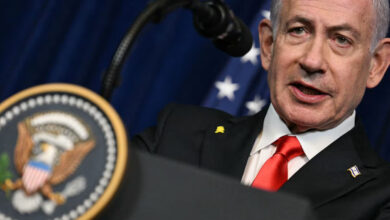
Israeli Prime Minister Benjamin Netanyahu may soon be forced to choose: Agree to a ceasefire deal with Hamas or keep his government in power.
But as he confronts that choice, Netanyahu is also looking for a way to avoid it altogether.
For months, Netanyahu has gingerly balanced these competing imperatives by refusing to even contemplate a permanent ceasefire as he blamed Hamas’s “delusional demands” for the collapse of previous rounds of negotiations. But after US President Joe Biden publicly outlined Israel’s latest ceasefire proposal on Friday – one that could lead to a permanent truce and which Hamas may be prepared to accept – Netanyahu is now out of time.
“I think that Bibi is cornered now,” said Aviv Bushinsky, a former adviser to Netanyahu, using the prime minister’s nickname. Biden is “forcing Bibi to take off his mask and say: ‘OK, now is the money time. Are you in favor of a deal?’,” he said.
As Israel awaits Hamas’ response to the latest proposal, National Security Minister Itamar Ben Gvir and other far-right members of Netanyahu’s coalition are already threatening to bolt from the government and cause its collapse if the prime minister follows through.
Amid the chorus of threats from his right flank, Netanyahu is trying to reframe the latest ceasefire proposal, insisting to Ben Gvir and others that the terms of the deal are not as Biden defined them. While Biden squarely framed the proposal as a way to end the war, Netanyahu is insisting Israel will not end the war until and unless Hamas is eliminated.
Netanyahu told the Knesset’s Foreign Affairs and Security Committee on Monday that “the claim that we agreed to a ceasefire without our conditions being met is not true.”
He appeared to be referring to the permanent ceasefire outlined in the second phase of the proposal, the conditions of which Israel and Hamas would need to negotiate during the first phase – a point Netanyahu has sought to emphasize in recent days.
According to Biden, the three-phase proposal would pair a release of hostages with a “full and complete ceasefire.”
But Netanyahu’s spokesperson told journalists at a briefing Monday that Biden had presented only a “partial” outline of the deal Israel had offered Hamas.
“The war will be stopped for the purpose of returning hostages and then we will proceed with further discussions. There are other details that the US President did not present to the public,” the spokesperson added.
The spokesperson reiterated Israel’s refusal to agree to any ceasefire until all hostages had been released, until Gaza no longer posed “a threat” to Israel, and until Hamas’s “governing and military capabilities” in Gaza had been eradicated.
“The notion that Israel will agree to a permanent ceasefire before these conditions are fulfilled is a non-starter. It’s not an option,” said the spokesperson.
Netanyahu’s efforts to convince the far-right ministers in order to avoid choosing between a ceasefire deal and the survival of his government have so far fallen flat. Ben Gvir said Monday that Netanyahu’s office refused to follow through on a commitment to show him the draft proposal, leaving him convinced the prime minister has something to hide.
If Ben Gvir or Finance Minister Bezalel Smotrich don’t back off their threats to leave the government, Netanyahu will be back to the binary choice that is beginning to materialize before his eyes.
Opposition leader Yair Lapid has offered to provide a “safety net” to keep the government in power in order to achieve a ceasefire deal, but doing so would also be handing Lapid the keys to forcing early elections once the deal is implemented.
Just as it has been over the past eight months, Netanyahu’s political survival may be wrapped up in the continuation of the war and his elusive pursuit of total victory over Hamas.
Netanyahu is confronting the choice between his government’s survival and a hostage deal at a time when his political fortunes have begun to improve. For the first time this year, Netanyahu edged out his chief political rival Benny Gantz as the preferred choice for prime minister for Israelis, 36 percent to 30 percent, according to a Channel 12 survey last week.

And a smattering of recent polls have shown Gantz’s National Unity party faltering, while Netanyahu’s Likud is making modest gains. National Unity would still win a plurality of seats in the Knesset, Israel’s parliament, but the party’s 19-seat advantage over Likud in December has dropped to a four-seat advantage in last week’s Channel 12 poll.
The improvement in Netanyahu’s political standing coincided with a surge of international condemnation of Israel’s war effort in Gaza and the International Criminal Court’s decision to seek an arrest warrant for Netanyahu, all of which have positioned Netanyahu domestically as Israel’s defender, a familiar and comfortable role for Israel’s longest-serving prime minister. Meanwhile, Gantz’s threat to leave the war cabinet over Netanyahu’s lack of long-term strategy in Gaza appears to be the cause of his drop in support.
A poll by Israel’s Channel 11 on Monday put the Israeli public’s support for the ceasefire deal currently on the table at 40 percent, with 27 percent opposed and 33 percent unsure.
But if Netanyahu is now contemplating whether there is more upside to continuing the war than reaching a ceasefire deal, Biden’s speech last week didn’t just force Netanyahu to confront that choice – it was also aimed at countering the pressure Netanyahu is now facing to abandon his own government’s proposal.
“I know there are those in Israel who will not agree with this plan and will call for the war to continue indefinitely. Some are even in the government coalition,” Biden said. “Well, I’ve urged the leadership in Israel to stand behind this deal, despite whatever pressure comes.”
Despite Netanyahu’s remarks that the conditions for ending the war “have not changed,” the US State Department said Monday it was “completely confident” Israel would go along with the proposal laid out by Biden. “The only thing standing in the way of an immediate ceasefire today is Hamas,” Matthew Miller told a press briefing.
But one key question remains: Will Hamas force Netanyahu to make the choice he now confronts? Or will Yahya Sinwar, Hamas’s leader in Gaza, offer Netanyahu an escape hatch of his own making?
Hamas said it viewed Biden’s speech about the latest Israeli proposal “positively,” but has yet to submit its official response.
While the latest proposal makes major concessions to close the gap with Hamas’s demands – including by offering a clear pathway to a permanent ceasefire – it still falls short of meeting all of the demands.
It allows an initial 6-week ceasefire period to be extended for as long as the parties need to negotiate a permanent truce that includes the withdrawal of Israeli troops from Gaza in a second phase of the deal. But it does not require Israel to commit to a permanent ceasefire upfront.
Hamas’s refusal to compromise on that point and sign off on this deal could let Netanyahu off the hook, and plunge Gaza into many more months of war.
This story and its headline have been updated.




